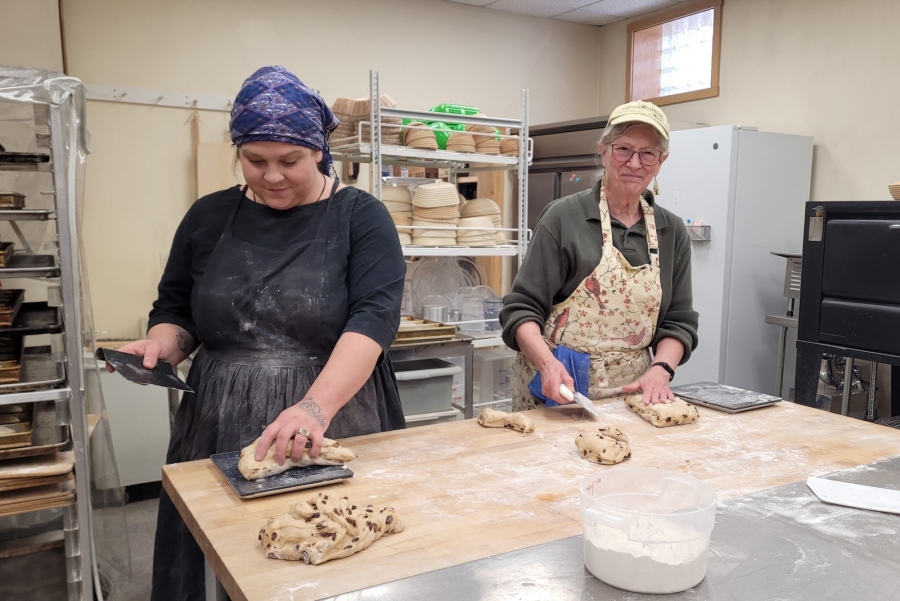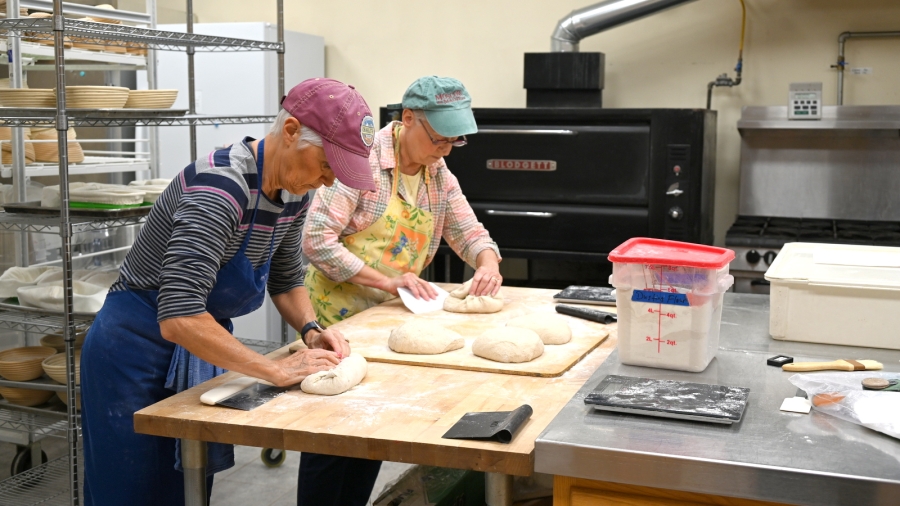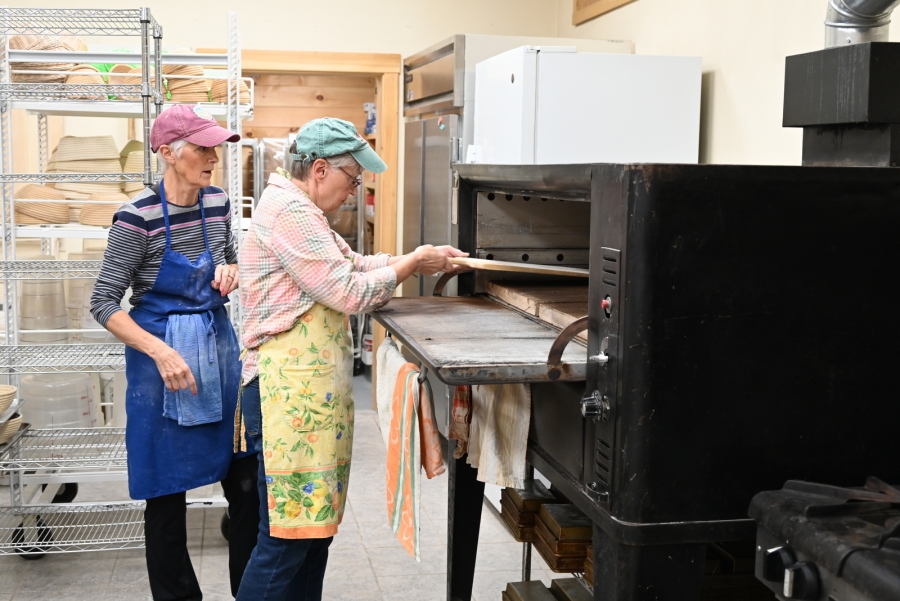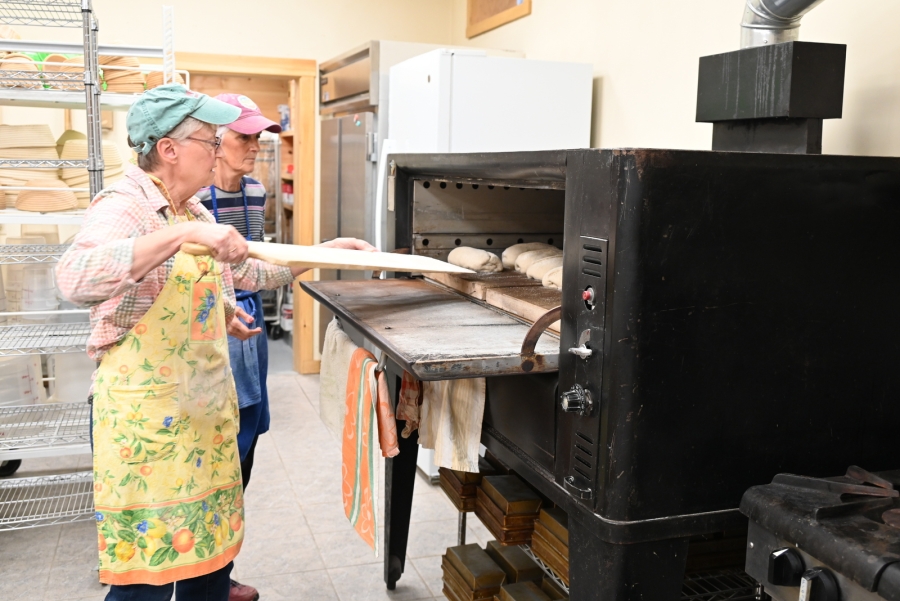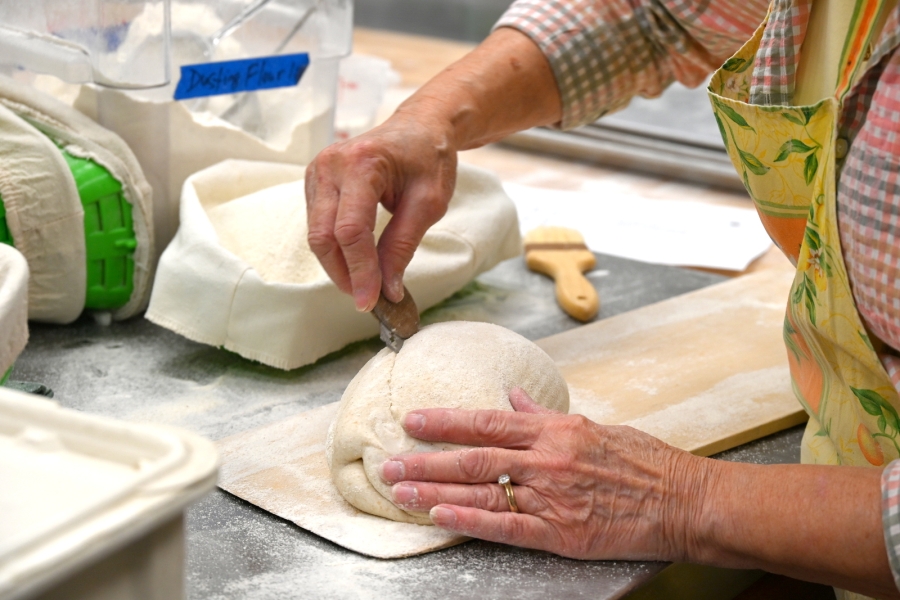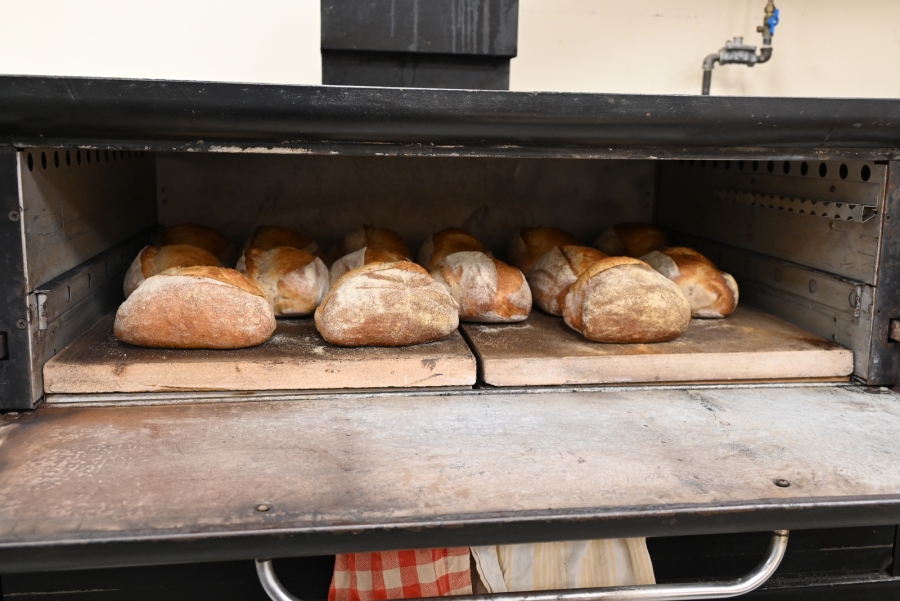Love for baking gives rise to Ora Breads
Measuring, weighing, mixing, hydrating, stretching, folding, resting, scoring, and shaping — these steps, along with some dedicated volunteers, are all essential elements of the bread making process at St. Rose of Lima Parish in Jay and St. Joseph Parish in Farmington.
Every week, thanks to the Ora Bread Guild, dozens of loaves of five grain, prairie seed, honey oat, sourdough, or other kinds of artisan breads come out of the oven in the community room at St. Rose of Lima, ready to be sold or distributed to community members.
“It has two purposes. One is for the benefit of those who are participating for the sake of baking bread but also for the cooperation and the learning of the skill and the craft,” says Father Paul Dumais, pastor. “Also, it’s outward facing to the community in a variety of ways. For example, the bread is available for sale at a couple of local businesses year-round in addition to the local farmers’ market. And, we bake some bread that is used in our direct service to the hungry.”
Ora Breads, the name of which comes from the Latin phrase “Ora et labora,” meaning to “pray and work,” got its start under Father Dumais’ tutelage and guidance. He says he developed an interest in bread making years ago after leaving college to work on a farm in Kansas.
“We raised wheat, and we traded wheat with a now-famous bakery in Lawrence, Kansas, called WheatFields,” he says. “That’s where I was introduced to freshly ground, freshly milled, local wheat that was used to make sourdough bread baked in a commercial wood-fired oven. That, for me, was kind of an aha moment in terms of discovering bread as real food, and over the years, I’ve kind of stuck with it in terms of a personal interest.”
It’s an interest he shared with parishioners, offering classes on the art of bread making. Mariette Castonguay, from Jay, is among those who attended.
“I had always baked bread at home, but he offered a bread baking class. I think it was French bread. I took it, and it was fun, and so I took it again,” says Mariette.
Some of the parishioners who took the classes began getting together to bake bread for the parishes’ community suppers. Father Dumais says they then decided to sell bread at the Farmington farmers’ market, and from there, it just expanded.
“There was a baker at the Better Living Center, which is a local health food store, who backed out, and they approached us, asking if they could make our bread available. So that’s kind of how it grew and developed,” says Father Dumais.
Mariette is the only one of the original bakers still participating. She left for a while, but came back, and now bakes sourdough bread every other Wednesday. It means coming in at 6:15 a.m. and not leaving until around 3:30 p.m.
“It takes a while,” says Mariette. “Generally, Anna and I will make 72 loaves of bread. Before Anna came, I did it by myself, so I would start at 6:15 or 6:30 a.m. and maybe I would leave by five.”
“I call myself ‘the helper’ because Mariette’s really the baker and I just help her because it’s a lot,” says Anna Lake, from Jay. “It’s not like making bread at home. We all make bread at home, and it’s nothing like this.”
“It’s quite a careful craft that you have to understand. You’re not going to be able to produce good bread if you’re not schooled in the process,” says Father Dumais. “Oftentimes, people think of bread like cooking. They think of the recipe or the ingredients, but it’s really more about the process. We do this professional, 12-step process, especially with the sourdough bread. Our intention is really to have a craft product, an artisan product.”
When it comes to measuring ingredients, for instance, Father Dumais says weight is what matters.
“One of the secrets of artisan bread baking is actually the weighing of ingredients more so than volumetric measurement. When I have a bread baking class, that’s the first thing we impress upon people. The first thing you can do to improve your bread at home is to start weighing ingredients and not using volume measurements,” he says.
Another key is temperature.
“To decide what we need for the temperature for the water, we take into account the dough temperature, the pre-ferment temperature, and the room temperature,” says Mariette.
“There are optimal temperatures for the dough to do what it needs to do, for the dough to rise and form gluten. If you can hone in on those optimal temperatures, the breads just rise more efficiently and the whole process goes a little better,” says Janet Brackett, who bakes pan breads every Thursday. “It does really make a difference. I do it at home now, too, because I have learned that’s the way you’re supposed to do it.”
Another difference, the bakers say, is treating your dough with care.
“You know how when your grandma teaches you how to bake, she’ll punch it down and that sort of thing? Father Paul is not about punching down the dough. We use gentle folding and stretching,” says Emily Goepel, from Hebron. “It is a much gentler approach, and it gives it an opportunity to develop a stronger gluten attachment.”
Although the pan breads don’t take as long to prepare as the sourdough loaves, Emily and Janet also arrive bright and early to begin baking.
“We start at 6:30 a.m., so I get up really early on Thursdays,” says Janet, who lives in New Sharon, a half hour from the church.
Nonetheless, she and the other bakers say they get a lot of satisfaction from participating in the Ora Bread Guild.
“I keep going back because I enjoy the process. I enjoy the people I bake with. I enjoy spending time with Emily. Sometimes, she brings her two kids. They’re homeschooled, and I enjoy spending time with them,” says Janet.
“I love baking with Janet,” says Emily. “We’ve built up such a nice friendship that I love. It’s my one thing that I do that’s away from home. We homestead, and I’m homeschooling, so I’m home 90% of the time.”
“Anna and I are good friends,” says Mariette. “I didn’t think I minded working by myself until she started working with me — because everything was timed and you are busy all the time — but it is nice to have somebody to talk to for sure.”
“I say [Mariette is] like a sister,” says Anna.
There is also the satisfaction that comes from seeing the loaves come out of the oven.
“When the breads come out, and we put them on this shelf, we’re both, like, ‘Look, how beautiful!’ We really do it every time,” says Anna.
The bakers say the breads also provide a positive connection with the community, both through the loaves that are given away to those in need of assistance and those that are sold in stores and the farmers’ market, the proceeds of which benefit parish social ministry programs.
“It’s trying to make bread, and then, let’s see what we can do with this bread so that we can help people,” says Emily.
“It gives us an opportunity to meet some of the people who love the bread. I mean bread is nourishment. It represents hospitality. It represents feeding your neighbors,” says Janet.
“I’ve heard that people from the neighborhood stop in, and they just want to chat about bread,” Emily says. “Everyone has a story about baking, whether they’ve done it, whether their grandmother did it, whether they’ve never baked in their life, but they remember a really tasty bread they ate.”
“We want a positive message out there. We want people to see us as wanting to help. This whole building, with the thrift store, and the community assistance, and with Ora Breads, I can’t tell you how many times people have told me how great it is,” says Dan Allen, director of parish social ministry. “It’s unique, and it’s not something that I think you could just do anywhere. I think you need somebody to inspire you, and we have Father Paul.”
“I think it’s important for parishes to be productive, and I think this activity and engagement has created a lot of goodwill in the community. For example, I’ve been asked to do a class with the Senior College,” says Father Dumais, who has also participated in workshops at the annual Kneading Conference in Skowhegan, which will be held this year on July 24-25. “I think people in the wider community have found it kind of humanizing in a sense. It’s like, ‘Oh, that is the priest who bakes bread.’ It kind of creates a point of contact. I think it has been positive and conversational.”







